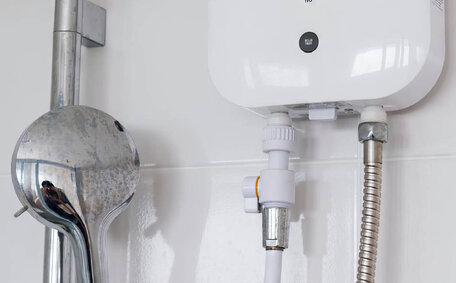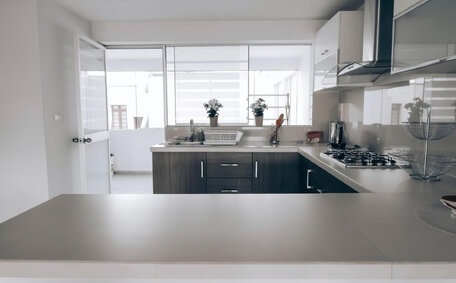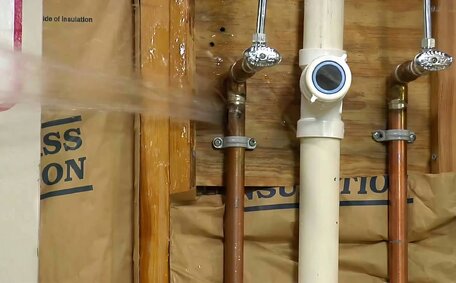Understanding Direct and Indirect Water Heating Systems
For an efficient hot water system in your home, there are two primary types to consider: direct and indirect. Indirect systems integrate well with renewable energy sources, while direct systems provide immediate hot water access.
Natural gas-fired heaters rapidly heat water and can be enhanced by a water softener; however, they are not ideal for long-term storage and may emit carbon monoxide if not ventilated properly. Tankless gas water heaters, commonly found in kitchens and laundries, typically depend on boiler-generated heat.
Indirect water heaters rely on a secondary heat exchange process to heat water, allowing the hot water cylinder to warm large volumes efficiently. Despite their ability to heat more water, indirect water tanks can incur substantial standby energy losses due to the additional heat transfer step.
We’ll delve into the pros cons and the difference between indirect water heating systems, comparing their strengths, shortcomings, associated costs and optimal use scenarios. This information provides a strong basis for choosing between a direct or indirect heating system based on your budget, usage requirements, and available space.
Most direct systems are suitable for tankless operations, which heat water on demand, ensuring a constant flow.
Your indirect water systems differentiate themselves by employing an intermediate heat exchanger to raise the water’s temperature. Indirect systems operate without an open flame; a separate boiler generates energy using gas, oil, electricity, or solar power to enhance efficiency. Heat is passed through from this chamber via conductive materials to a water coil or tubes, all without direct interaction.
This separation leads to a versatile and safe high-energy heater system. New hot water systems can effectively store hot water for space heating in insulated tanks, and also integrate with solar collectors or hydronic heating systems. However, an additional heat transfer step in these systems reduces their overall efficiency compared to direct heating.
Alternatively, indirect systems necessitate additional room for the storage tank and solar collectors. While the storage hot water heater has fewer components that wear out, regular maintenance of the heat exchanger coil is needed to maintain peak efficiency.
Efficiency Comparison of Direct vs Indirect Heaters
Direct systems are effective in generating warm water, as well as assisting in warm air production by transferring the majority of heat energy from the gas or electric source directly to the water.
Direct water heaters shine in maximizing heat utilization, keeping energy loss to a minimum without generating unwanted hot air. These systems maintain all heat within the closed heating elements, excelling in delivering an uninterrupted, instantaneous supply of hot water.
Indirect heaters use some efficiency through heat transfer steps taking place in the heat exchanger. Instead of directly heating water, they use an intermediate heat exchanger to pass thermal energy between the heat source and water flow. Indirect heaters experience some heat loss during the transfer between mediums.
The dissipated heat can be recaptured when water heaters are fitted with heat pumps that employ advanced technology. These heat pumps, when combined with indirect heaters, enhance the use of solar collectors, exploiting free and renewable energy sources.
Evacuated tube solar thermal panels can supplement standard heat sources, reducing energy use and cutting operational costs. So, to understand the cons indirect water systems which sacrifice some outright efficiency for gains in solar water heating, don’t worry about efficiency losses.
For your property, especially with ample roof space for solar collectors, a water cylinder, utilizing indirect resources, presents an attractive choice. The tank also helps manage variable solar input. However, for properties with constrained roof space or less solar exposure, direct heating units are often more efficient than indirect tank water heater options.
It’s essential to choose a heating system that aligns with your requirements, ensuring it operates optimally without direct exposure to environmental elements.
When it comes to installation, direct water heaters offer more flexibility thanks to their compact all-in-one design. Smaller tankless models are conducive to small enclosed spaces, such as under sinks, and are a smart choice for any main pressured gas or electric hot water system.
Indirect heaters require space for storage tanks and, if used, solar collector panels. Proper alignment of these panels, accounting for shade, optimizes their efficiency. To ensure consistent performance, electric or gas backup systems activate when solar input is insufficient.
With professional installation, your hot water system is set up with precision and safety, guaranteeing efficient and reliable performance for years.
Smaller units designed for tankless water heating can fit in tight spaces like under sinks to provide an instant supply of hot water where needed.
Direct systems, devoid of a hot water tank, occupy less space. However, they often need extra cold water piping, which can reduce installation simplicity. It’s wise to consult with professionals for installations to ensure optimal water pressure and safety.
However, the storage tank integrates seamlessly with the water supply line. Apart from roof reinforcement for collectors, the installation process is relatively straightforward.
Operating and Maintenance Costs: Direct vs Indirect
Considering long-term operating and maintenance expenses, indirect water heater systems can prove to be more cost-effective.
Direct fired heaters inherently avoid certain inefficiencies, while indirect water heaters, consisting of storage tanks and extra heat exchangers, can have longer lifetimes of 15-20 years due to less direct wear. Coupling these systems with solar collectors can notably reduce fuel expenses over time, offering substantial savings.
Space tprint suits confined areas like under benches or inside cupboards without taking up living space.
Indirect systems need space so the unit can readily accommodate insulated storage hot water tanks and solar collector panels. Spaces catering for insulated storage tanks are needed; and in Bexley, connecting solar water systems with your indirect water heater can be a savvy choice. We can advise on space requirements and help you leverage free solar energy to maximise cost savings from your indirect system.
Ideal Applications for Direct and Indirect Water Heaters
When a capable heater for your hot water needs is essential, direct water heaters excel as the water heater of choice. Their instant and continuous flow capabilities are perfectly suited for environments with a high water demand like restaurant kitchens, hair salons, and fitness centres, where usage patterns greatly vary. In Bexley homes, natural gas fired direct heaters are particularly suitable for kitchens or other areas where small, intermittent access to hot water is needed.
For properties with high hot water demand but limited space, innovative tankless type water heating solutions present an efficient system for your alternative. The external storage tanks centralise and efficiently pump water, buffering hot water for distribution around sites via circulator pumps. These systems suit hotels, hospitals, commercial buildings and multi-dwelling units with centralised piping and high frequency of using hot water across many taps or processes.
Your Indirect hot water systems, with more available hot water, can be utilised to fully tap into solar water heating systems, giving them an edge, particularly in Bexley’s sunny climes. Solar thermal handles 50-80% of water heating needs in sunny months, slashing running costs. Locations with ample sunlight, where occupants frequently use hot water, stand as prime candidates for indirect systems.
Making the Right Choice: Direct or Indirect Water Heater?
In deciding between direct and indirect water heaters for your Bexley dwelling, weigh up aspects like hot water demand, space availability, financial plan, and green objectives.
For a single-bathroom abode with lower occupancy, choosing an instantaneous gas water heater connected directly to the hot water tap ensures a continuous flow can result in cost-efficient outcomes both initially and long-term. Just ensure accessible cupboard space for a compact unit that can run efficiently. We recommend models rated above 24kW to supply enough hot water concurrently for shower and sinks.
Larger homes or those energy-conscious may tilt towards this more expensive type water heater - a new, hot, indirect solar setup. Storage tanks centralise 300-500 litres of hot water for distribution to multiple bathrooms and taps. Solar thermal panels then reduce gas booster usage for free hot water whenever the suns shining.
To ascertain the water heating solution that represents the finest enduring investment for your property, reach out to our Bexley Plumbing team on 1300 349 338 or shoot an email to [email protected]. Well assess your needs and deliver trusted advice on hot water solutions to suit your home.






